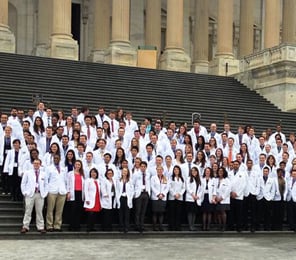
UMass Medical School was represented among the 300 medical students, some of whom are pictured here on the steps of the Capitol in Washington, DC, who met with legislators to discuss the negative impact the pending federal budget sequester will have on graduate medical education and patient care.
Reductions in Medicare financing for graduate medical education (GME) will be among the federal budget cuts triggered if Congress lets the impending sequester take place on March 1. The timing is alarming for fourth-year medical students who, just two weeks after the sequester deadline, will find out from the National Residency Matching Program where they will continue their GME training as residents.
Matthew Lecuyer, a fourth-year UMMS School of Medicine student, was one of 300 medical student members of the American Medical Association (AMA) who convened on the steps of the Capitol on Monday, Feb. 10, to urge lawmakers to preserve Medicare funding for residencies. The students were in Washington, DC, for the AMA’s annual National Medical Student Advocacy Day.
“We talked about how sequestration would severely damper GME because any cut will immediately eliminate positions,” said Lecuyer, who met with U.S. Sen.Elizabeth Warren and U.S. Rep. James McGovern. “We’re not sure if this will mean fewer positions for my class, but it will definitely affect the classes of 2014 and 2015.”
There is wide agreement that adequate funding of GME is critical to ensure access to current and future medical services. But despite the impending shortage of physicians in many medical specialties and states, especially primary care and underserved regions, the number of residency training positions funded by Medicare has been capped since the passage of the Balanced Budget Act of 1997. And while medical schools have expanded enrollment to address the shortage, the American Medical Association predicts cuts to federal funding for GME will create a bottleneck in medical training that will exacerbate physician shortages and further erode patients’ access to quality medical services as soon as 2015.
Significanty, 2015 will also be the year in which second-year School of Medicine student and fellow AMA-Medical Student Section member Eli Freiman hopes, like Lecuyer, to enter a pediatrics residency in Massachusetts. But even though both aspire to practice primary care, where the workforce shortage will be greatest, more medical school graduates competing for fewer residency slots means the chance of being able to practice what and where they want is diminished.
“It’s great to be at a medical school like UMMS that is such a champion of primary care, but It’s very hard to balance the mission statement of my life against the fiscal reality,” noted Freiman. “When you look at the bottom line of how much debt we’ll have and where the jobs will be available, options outside of Massachusetts and in specialties other than primary care start to look more enticing.”
Lecuyer agrees, albeit reluctantly. “I grew up on public assistance in New Bedford and it was a goal to come to UMass. I’m here and think I match the mission statement of the school very well, in that they want to create primary care physicians for the commonwealth, and I feel indebted to the commonwealth and want to give back,” he said. “But the likely reality is that I will become an export of my medical education rather than being able to stay here because of all the competition for the capped number of available residency spots.”
Regardless of what happens on Capitol Hill next week, Lecuyer and Freiman plan to continue their active participation in organized medicine and advocacy. “Not just about individual doctors and patients, medicine is an institution that requires active and informed participation by everybody involved,” said Freiman. “It is my responsibility to continue fighting for what is best for our patients.”
Related links on UMassMedNow:
Tomorrow’s doctors become today’s leaders in American Medical Association
Chancellor Collins visits D.C. to brief lawmakers on economic and health threats of drastic cuts